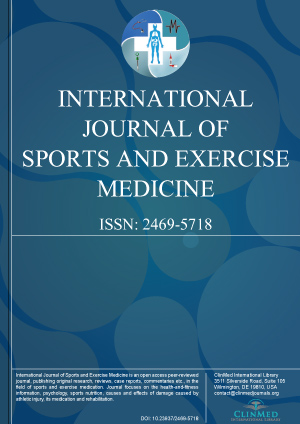Archive
Open Access DOI:10.23937/2469-5718/1510070
Call to Action: Enhancing 'Exercise is Medicine' from the Perspective of Fitness Professionals
Taniya S Nagpal, Liza Stathokostas, Harry Prapavessis and Michelle F Mottola
Article Type: Short Communication | First Published: August 31, 2017
Article Formats
- Full Article
Open Access DOI:10.23937/2469-5718/1510069
Exercise, Nutrition and Gut Microbiota: Possible Links and Consequences
AV Costa, G Leite, A Resende, F Blachier and AH Lancha Jr
Article Type: Review Article | First Published: August 24, 2017
Article Formats
- Full Article
Open Access DOI:10.23937/2469-5718/1510068
Eri Sarashina, Katsuyoshi Mizukami, Hanatsu Nagano and Rezaul K Begg
Article Type: Research Article | First Published: August 14, 2017
Article Formats
- Full Article
Open Access DOI:10.23937/2469-5718/1510067
Glucose Turn Point as a Marker of Exercise Intensity in Elite Swimmers
Emma Swanwick and Martyn Matthews
Article Type: Research Article | First Published: August 11, 2017
Article Formats
- Full Article
Open Access DOI:10.23937/2469-5718/1510066
Amy Hassen, Ariel Klingaman and Jennifer Reneker
Article Type: Research Article | First Published: July 21, 2017
Article Formats
- Full Article
Open Access DOI:10.23937/2469-5718/1510065
The Long-Term Effects of Stand-up Paddle Boarding: A Case Study
Ben Schram, Wayne Hing and Mike Climstein
Article Type: Case Study | First Published: July 12, 2017
Article Formats
- Full Article
Open Access DOI:10.23937/2469-5718/1510064
Land Based Resistance Training and Youth Swimming Performance
Marie Clare Grant and Mykolas Kavaliauskas
Article Type: Research Article | First Published: July 08, 2017
Article Formats
- Full Article

Volume 3
Issue 4
Issue 4
